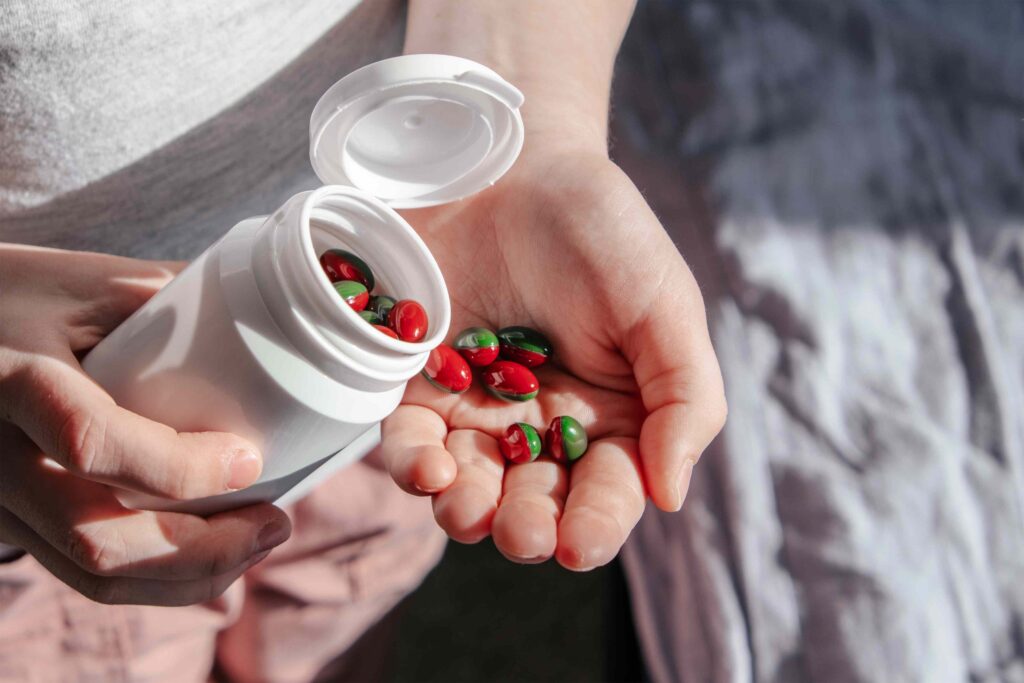Iron supplements can help if you have low iron levels, iron deficiency anemia, or have difficulty reaching your daily iron needs through diet alone. Common side effects of using iron supplements, particularly in doses of 45 milligrams per day or more, are digestive symptoms like constipation and bloating.
Current evidence suggests that iron supplements cause constipation through two proposed mechanisms: bacterial imbalances and water loss in the gut.
1. Bacterial Imbalances
Iron supplements, especially unabsorbed iron, can change the balance of bacteria in your gut. They encourage potentially harmful bacteria like E. coli and Salmonella to grow, while reducing helpful ones like lactobacilli.
This shift may increase organisms that make methane gas. Too much methane may slow down digestion, which may cause constipation and bloating. However, not all studies agree that methane is a direct cause of constipation. Further research is needed to understand the relationship.
2. Water Loss in the Gut
When excess iron sits unabsorbed in your stomach, it pulls water away from the lower parts of your digestive system, like your colon. The colon needs water to help keep stool soft. Losing that water can cause your stools to become hard and lead to constipation.
If you are constipated or have fewer bowel movements as a result of taking iron supplements, consider these ways to relieve or manage constipation:
- Take iron on an empty stomach: Your body absorbs iron best when you take it on an empty stomach. Better absorption may mean less constipation. Try to take iron at least 30 minutes before eating.
- Drink plenty of water: Drinking more water or other liquids can help keep your stool soft, as iron tends to pull water away from the colon. Aim for at least two to three liters of water daily.
- Eat more fiber: Fiber-rich foods like pears, vegetables, beans, and whole grains can help keep your stool soft. You can also try a fiber supplement such as psyllium husk.
- Try bowel training: Train yourself to try having a bowel movement at the same time every day to help build a routine. Research suggests that having a bowel movement 15-45 minutes after breakfast can help, as eating stimulates the bowel.
- Exercise: Get at least 30 minutes of exercise daily. Research suggests that simple daily exercise, like walking, can help manage constipation.
- Consider using a stool softener: If lifestyle approaches don’t help, consider stool softeners like Colace (docusate sodium) or gentle laxatives like Senakot (senna) to help ease bowel movements.
- Lower the dosage: Talk to your doctor about reducing how much or how often you take iron to help minimize your risk of side effects.
Other potential side effects of oral iron supplementation include:
- Nausea
- Vomiting
- Diarrhea
- Gas
- Metallic taste in your mouth
- Tooth staining
- Tarry black or green stool
- Abdominal pain
You may have other options for increasing your iron intake.
Different Oral Supplement Types
Using a different form of iron may improve your bowel movements. Common forms of oral supplementation include:
- Ferrous fumarate
- Ferrous gluconate
- Ferrous sulfate
Studies suggest that the form of iron called ferrous sulfate is more likely than other forms to cause constipation.
IV Iron
Iron given intravenously (through an IV) doesn’t usually cause constipation because it goes straight into your blood instead of passing through your intestines. A healthcare provider has to administer it, so it’s less convenient for many people. IV iron is also much more expensive—over 60 times the cost of iron pills.
Slow-Release or Extended-Release Iron Supplement
Extended-release iron tablets release iron slowly, which may reduce the amount of unabsorbed iron in the gut and lower the chance of constipation, though research isn’t conclusive. These forms may not be absorbed as well, making them less effective for people with severe anemia.
Dietary Iron
Your body absorbs iron from food in smaller amounts, which lowers the chance of constipation and other digestive symptoms. For example, if you eat 10–15 milligrams of iron each day, you asborb only about 1–2 milligrams.
Foods that are rich in iron include:
- Lean meat
- Seafood like oysters and clams
- Nuts
- Beans
- Vegetables
- Fortified grain products
See a doctor right away if you have constipation and any of the following symptoms:
- Blood in your stool
- Rectal bleeding
- Constant abdominal pain or cramps
- Lower back pain
- Fever
- Inability to pass gas


